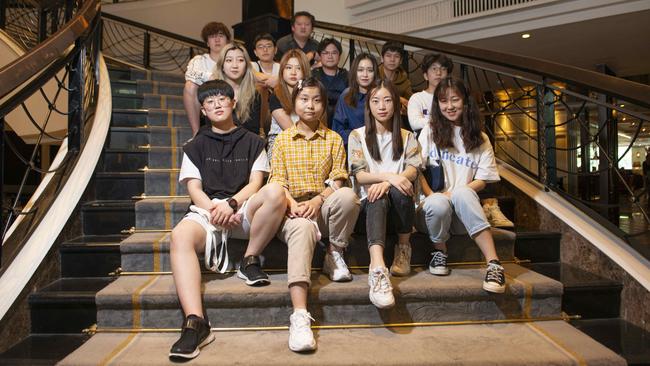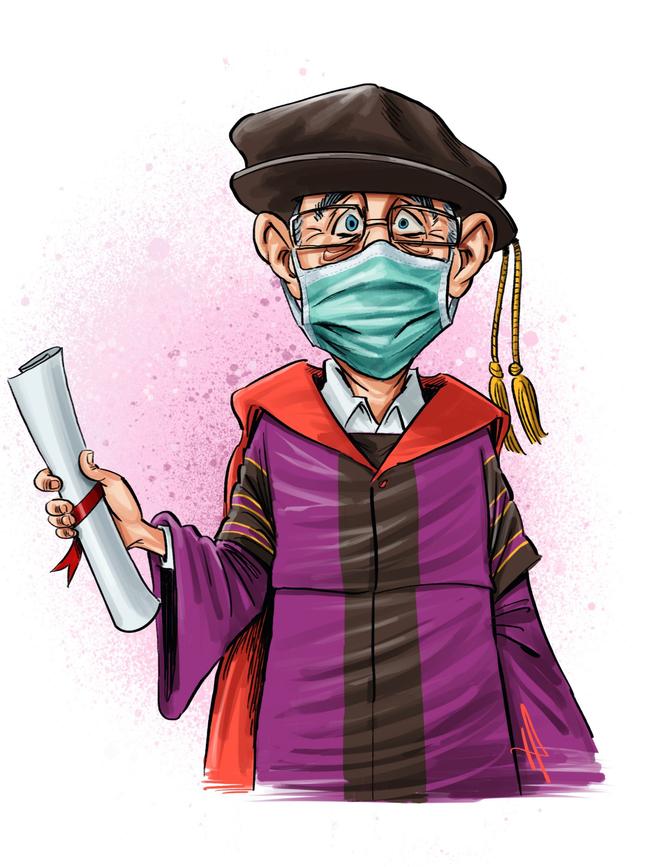Miranda Devine: Our China-reliant universities cannot risk the nation’s safety
The unfolding coronavirus crisis shows us the danger of letting Australian universities and other parts of the economy become overly dependent on goings on in China, writes Miranda Devine.
Rendezview
Don't miss out on the headlines from Rendezview. Followed categories will be added to My News.
If anything tells the story of Australian universities’ over-reliance on China, it’s their panicked response to the coronavirus epidemic
Exhibit A: In an attempted end-run around the federal government’s prudent quarantine rules for students returning from China, Western Sydney University has been offering Chinese students $1500 to transit via third countries “to help cover the cost of airfares and 14 days’ accommodation”.
The ban on anyone arriving in Australia from China has just been extended to February 29, but if you already have availed yourself of the loophole you can evade that restriction.
“Our students are keen to travel to Australia and start the new academic year as soon as possible,” the university said.
Fair enough, but Australian is keen to keep out the coronavirus contagion and that is more important than pandering to the impatient customers of universities which should have thought long ago of the potential ramifications of relying so heavily on revenue from overseas.
Any university which places the health of its balance sheet above the health of the Australian community ought to be deregistered.

After all, Australian taxpayers pay more for universities than the Chinese students they cravenly centre their institutions around.
Those taxpayers and their children are being put at risk because universities are too reliant on China and never made contingency plans for foreseeable crises like a looming pandemic.
The federal government’s decision to impose an initial travel ban on China and then extend it this week is not a game to be outsmarted. It’s a public health necessity.
Students understandably are frustrated. If you’re paying $45,000 to attend an Australian university, you expect a service.
But it is ridiculous to claim, as some panellists on the ABC program Q&A did on Monday night, that it is racist to take precautions to prevent the spread of the virus.
Chinese Australian Forum president Jason Yat-sen Li, complained on the show about “content online … It’s so easy for it to descend into racism and xenophobia and the yellow peril that’s close to the surface.”
Journalist Stan Grant agreed, maligning Australia as “a deeply unprincipled nation when it comes to issues of race. It is at the core of who we are”.
Speak for yourself.
Putting aside the truism that those who scream the loudest about racism and intolerance usually are projecting their own feelings onto others, the fact is that there are major outbreaks of the virus now outside China, most recently, in Italy, Iran and South Korea.
While the World Health Organisation has resisted the “pandemic” label, it reports 80,000 confirmed cases and more than 2,500 deaths in 28 countries. So far there are 24 people reported to have contracted the virus who are in Australia, and a further 47 infected Australians on board the Diamond Princess cruise ship in Japan.
In an article in The Atlantic magazine this week, titled “You’re Likely to Get the Coronavirus”, Harvard epidemiology professor Marc Lipsitch said that it is most likely that the disease, also known as COVID-19, will ultimately “not be containable”.

So until we develop a vaccine, which will take at least a year, the only sensible approach is to limit the spread of the virus.
If China sneezes the world gets a cold, goes the saying. The stock market is down, and many drugs are facing worldwide shortages because up to 85 per cent of the raw ingredients are only manufactured in China.
The coronavirus contagion shows the insanity of building a business dependent on a totalitarian police state, and none more so than Australian universities.
Chinese students comprise 40 per cent of total higher education enrolments, and according to the Financial Times, our universities have the highest ratio in the developed world.
The upshot to our economy is a $12 billion exposure, according to a paper from free-market think tank, the Centre for Independent Studies, published last week.
Chinese students provide more than 20 per cent of revenue at the Universities of Sydney, NSW and UTS, and now that’s at risk.
But the unis only have themselves to blame. Having grown rich on Chinese student enrolments, they now “must face the music”, writes political sociologist Salvatore Babones in “Australia’s Export Exposure to China’s Coronavirus Epidemic”.
While university vice-chancellors aggressively lobby the government to lift the travel ban, it’s the taxpayer who bears the risk. It will be Medicare, not the universities, having to foot the bill if returning students spread the coronavirus into the general population.
Babones also warns that universities and private companies such as Qantas – which had about four per cent wiped off its share value yesterday — are likely to ask taxpayers to compensate them for the financial consequences of the coronavirus, by claiming that the government “overreacted” by imposing a travel ban.

Apart from the fact that other countries, including the United States, have imposed similar bans, why should the taxpayer be burdened by the reckless failure of these institutions to plan for a rainy day, like most hardworking Australians do?
Babones points out the coronavirus “would not have turned into an economic crisis for Australia’s universities if the universities had not irresponsibly pursued Chinese student enrolments beyond prudent levels”.
“Instead of seeking to restore their outsized dependence on China as quickly as possible, [universities] should use the crisis as an opportunity to transition toward less risky export strategies.”
Amen to that.
But our woke university vice-chancellors seem more interested in placating Chinese students caught by the coronavirus travel ban than preserving the health of the students already returning to lectures.
Originally published as Miranda Devine: Our China-reliant universities cannot risk the nation’s safety
